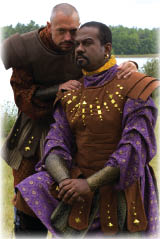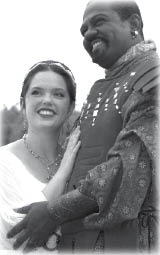Something Moor
by Thomas Dooney

Perhaps it is because of his bearing: Strong but approachable. Perhaps it’s the way he speaks: Articulate, both vocally and verbally.
Wherever Jolie Garrett goes, complete strangers walk up to him for help. Tourists approach him for directions. People just assume that he is in charge of something.
This perception of control extends to the roles offered to him—noblemen, dictators and gods—Don Pedro, Julius Caesar, Oberon. However, for his entire 20-year career, the Shakespearean role that was always out of reach was the one he most desired to play: Othello.
Othello, steeped in jealousy, lies and revenge, had not been produced by Shakespeare in Delaware Park for 17 years. Although announced to the public a year in advance—as late as this April—the cast was posted with a hole where the leading man’s name should be.
Saul Elkin, the festival’s founder and director of the production, concedes that he was certain he could dip into the local talent pool to cast the role. He auditioned the most viable actors but felt compelled to see others. “This is one of only a handful of times in our history that we had to go outside of Buffalo,” Elkin noted. While he had two or three candidates in Buffalo, in New York City he auditioned three dozen Othellos. Jolie, he felt, stood head and shoulders above them all.
Like a Ph.D. in academia or a corner office on the executive floor in the corporate world, the role of Othello is a target destination for many black actors. “For black actors,” explains Jolie Garrett, “Othello is like Hamlet. A role with everything.”
Garrett admires the script and not just the starring role. He likes that the play is unencumbered by subplots. “There are no witches over here, no girls dressed as boys over there,” he explains. “Nothing to slow down the main story.”
“I have studied this role. I’ve studied Othello for ten years. I’m sure that’s what Saul saw in the audition. I read as if Othello were already mine.” Now, states Garrett, “actually having this role will change everything for me. Things will fall into place, they already are. This will be the first time I play this role and I know now that I will play it again.”
What does he expect to prove in Buffalo doing the role in production for the first time?
“That I can get through it,” he bellows with a clarion laugh. “Really, setting the foundation upon which I can steadily build the character.” A determinedly self-guided actor, Garrett imagines setting improvement goals night after night. Similarly, he imagines maturing with the role as he plays the character over the course of years.

What concerns Garrett at this moment is making clear the character’s progress from start to end. “So many actors play the role without an arc,” he explains. “You can’t enter for the first time(harrumph!) with everything.”
Garrett wants audiences to see a clever, humorous and loving Othello. Garrett points out that Othello genuinely loves Desdemona and admires her intelligence and spirit, possibly more than her own family and friends do prior to their elopement.
Referring to the earliest scenes of the play, Garrett quotes generously from the text, even for someone immersed in rehearsal. He knows his parts as well as all the others, providing proof of his decade of study.
“He is a military man but he knows when not to fight,” he says. Garrett believes Othello has potential to be more than a soldier, that he could become a Roman statesman. He reasons that if Othello is seen as too violent too early, there will be no appreciation of his desperation and no surprise in his fate.
Some critics believe, despite the play’s title, the story belongs to Iago, whose actions establish a confederacy of unwitting conspirators to prevent Othello from succeeding. Iago’s manipulation of the others is seen as dramatically active, while Othello himself is stalled in emotion.
If Iago is the play’s motor, Garrett counters, then Othello is the vehicle’s mast and sails. According to Garrett, there is beauty in Othello’s majesty, artistry in showing his evolution and tragedy in his fall.
Many interpreters of Shakespeare’s scripts, to make stories more relevant for audiences, move the stories forward by decades or centuries, just as Shakespeare in Delaware Park’s current production of All’s Well That Ends Well was transposed three hundred years from an Elizabethan to an Edwardian setting.
Othello will be moved back in time by 1,500 years, from the Renaissance to the first century, on the cusp between the Roman Republic and the Roman Empire. This era is after the Roman persecution of Christians and at the threshold of the sweep of Catholicism throughout the empire. This enhances the suspicions between Othello the moor and the Romans around him. They are evidently Christians by their prayers and behavior. Othello and some of the other characters are suggested to be Muslim, a point accentuated by Shakespeare, having set the play, in part, in Cyprus.
In addition, Jolie Garrett is mindful of the play’s 400 year history. The contribution of U.S. theater to Othello has been to promote the casting African Americans in the title role. Ira Aldridge was the first, prior to the Civil War. Garrett lists others over the course of 200 years, up to and including Laurence Fishburne, many of whom lived off high-paying less dignified acting jobs until they could make their mark on Othello.
“When this is over,” he promises, “I’m buying a big picture frame. And in it, I’m putting pictures of Aldridge, Paul Robeson, James Earl Jones, Fishburne... and me.”
Othello opens on July 26 and will play through August 19. There are no performances on Mondays or in the event of rain. The theater is located on Shakespeare Hill in Delaware Park, near the casino entrance at Lincoln Parkway behind the Rose Garden. There is no charge, but the hat is passed for donations at intermission. For information call 856-4533 or see the web site at www.shakeseareindelawarepark.org.
|
Issue Navigation> Issue Index > v6n28: Timber! (7/12/07) > Something Moor This Week's Issue • Artvoice Daily • Artvoice TV • Events Calendar • Classifieds |









 Current Issue
Current Issue